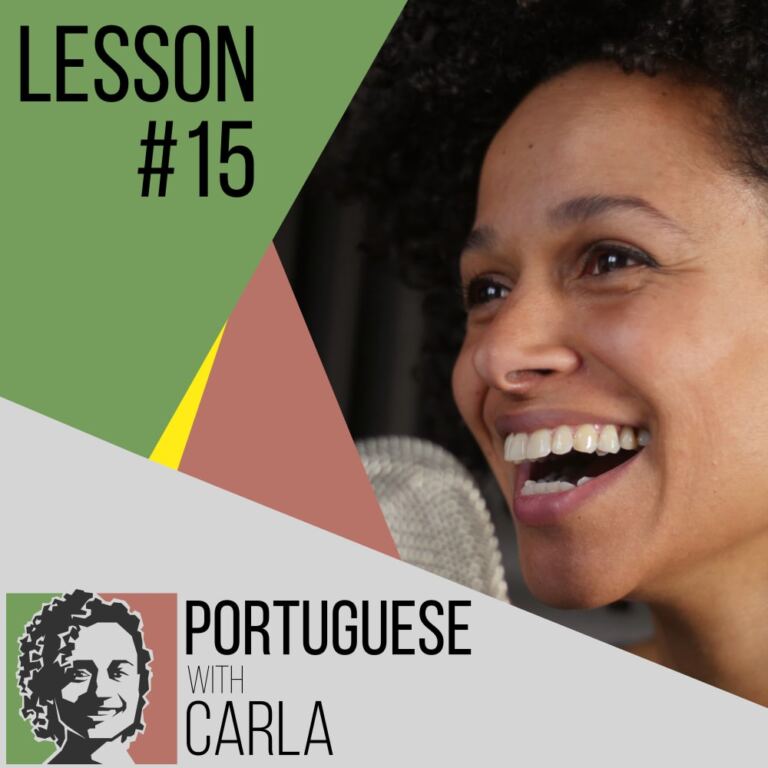Free Audio Course – Lesson 3
For the 3rd lesson in our free portuguese course we’ve decided to start a coherent and continuous journey with our dialogs from week to week. We will follow a family on their holiday in Portugal. What sort of things are they likely to encounter? What are the common phrases and expressions?
Also in this lesson: How can singing help when learning a new language?
Listen in.
Thanks
By Carla Sabala
Portuguese Transcript
M- Boa noite, desculpe onde fica o balcão de aluguer de carros?
C- Qual é o nome da companhia?
M- Enterprise.
C- É fácil. Fica mesmo ali por trás daquelas escadas rolantes
M- Ah ok, obrigado.
M- Boa noite!
C- Boa noite. Como posso ajudá-lo?
M- Precisava de um carro para 15 dias, por favor.
C- De 3 ou 5 portas?
M- 3 é suficiente, obrigado.
C- Prefere com transmissão automática ou manual?
M- Tanto faz.
M- Queria seguro contra todos os riscos por favor.
C- A sua carta de condução por favor?
M- Aqui tem.
C- São €324 por favor.
C- Confirme o valor e insira o código por favor.
C- Ora bem, aqui tem a chave. O carro está no primeiro andar do parque.
M- O carro é a gasolina ou gasóleo?
C- Gasóleo.
M- Obrigado.
C- De nada.







I love the fact that you and your husband do these podcast they are soo helpful (me and my daughter listens to this every evening who is half portuguese, which is another reasok why I want to continue learning) as someone who has been learning Portuguese on and off for years this is definitely the best decision I made. Muito Obrigada!
BTW: I was wondering if you do classes in London?
Olá Marie!
We are very pleased to hear both you and your daughter are finding the podcast helpful. You’re very welcome!
I’m sorry to say I don’t do classes in person, only online via Skype.
Thanks again!
Carla
Well at least I know I’m getting somewhere :3 before I started learning from this prodcast I could never follow the conversation by reading. I can now 😁
Also. Is it common for people no be able to roll their lounge? My mom is part Spaniard, Portuguese and italian but cant roll her tounge. But me and my brother and sister can.
Hi Elijah,
That’s fantastic. Thanks for taking the time to write in. 🙂
The rolling of the tongue: well, it really depends what language you brought up with. But some find it easier than others and some who learn the language as adults may never master it.
Mind you, even portuguese natives sometimes have trouble with it 🙂
Dear Carla and Marlon,
My husband and I love your podcast a lot. You guys have beautiful voices with sincere.
The theme idea is also great, practical and very quickly can use them in the real life. We now use your podcast as self learning main material.
We have a small question re pronunciation of “t” in Portuguese. It sounds sometimes like “Tee” but some times sounds more like “de” . Which is correct way or maybe in real life, it indeed has both ways?
Thank you…
Linda from China
Olá Linda!
Thank you so much for your positive feedback 😀 We’re very pleased to hear both you and your husband are enjoying the podcasts!
The letter “t” is pronounced as a “tee” or “te” but not as a “d”. It may sound that way to some natives of other languages, perhaps because we do not over stress it, but pronounce it softly a lot of the time. Hope that makes sense 🙂
Carla
Querido Carla e Marlon.
i
I have learnt so much correct pronunciation in just three lessons. I have learnt that tem is pronounced more like tyne than the way it is written. I have learnt that I can drop the e at the ends of many words ( chave. desculpe ) and I have also learned to say obrigado like a native speaker. In the narrative I have noticed that Marlon uses para and por in his repetition of the sentence “Precisava de um carro para…………..” I think it should be para but would be interested to know if you could also use Por.
Obrigado e até logo.
David.
Thanks David. Glad you’re enjoying these lessons. I noticed you also signed up for our program. Welcome!
Talking of which, we have 3 lessons in the program dedicated to the “por” vs “para” question. In this case though, “por” would make sense as that preposition is used when talking about a period of time. So the car hire will be for 15 days. But “para” is also acceptable in coloquial speech.
Hope that helps
Marlon
The literal translation of gasóleo is gas oil. In the UK this name is sometimes used for ‘red diesel’ which is low tax diesel used for construction industry, farming, and heating. (Red diesel has a red dye in it which is supposed to prevent it from being used illegally in road vehicles)
Carla! It’s been a few years since we did Skype lessons and I’m so glad that I found that you are doing these podcasts!! Muito Obrigada. I only wish I would have found them sooner! I want to brush up again on my Portuguese since I will be sailing to the Azores in June and one of my husband’s cousins told me I better speak Portuguese next time I visit!
Olá Emily!! How nice to hear from you! I am pleased to hear you’re still taking the time to learn portuguese. It seems you also have a deadline – no pressure there 😅
We also have a Program called Carla’s Babies. It includes video scenes in portuguese, explanations of dialogs both in portuguese (with portuguese subtitles) and english, practice and understand pronunciation section, quizzes and a little more! It’s a subscription website – monthly or anual. First week is a free trial – if you cancel it before the first 7 days are up then you won’t pay at all. If you’re interested in finding out more please register your interest here: portuguesewithcarla.com/member and you will receive emails with more information.
Carla
Dear Carla and Marlon,
I enjoyed the lesson, you two are such a great speaker which i can easily follow the words and have no problem in the accent. Is it ok that I am just memorizing without actually knowing what am i doing? Will this be ok ?
Muito obrigada
Hey there, glad you’re enjoying it thus far.
In answer to your question: well, I’m not sure what exactly you were referring to, but of course it helps to have an idea about what exactly you are memorising. 🙂 But if you’re a bit more specific, I can try to give you a more concrete answer.
Marlon
Hello Carla and Marlon,
I started listening to these pods this week. I am enjoying them. It’s so nice to hear the Portuguese language again. Both of my parents were born in Portugal, mainland. My brothers and I were all born here in America. Unfortunately, we never became fluent in Portuguese, although we all were enrolled in classes either in high school or college. My parents are deceased now. I’ve always been disappointed in myself for not learning the language, especially when I attend a function with Portuguese speaking people. I’m determined to learn and to become fluent. I’m finding the podcasts easy to listen to and learn from. Thank you for this opportunity to listen and learn without any commitment. I looked into purchasing the plan but am not sure, at this time, that I’d be able to make the commitment to finish the entire program. Do you offer a plan for half a year or any other discounts?
Thank you in advance.
Ann
Glad you’re enjoying it Ann. Keep it up! I’ll email you about the Journey program
Fascinating stuff! Fun fact – the prestige dialect in the USA is actually a Canadian dialect of English from the Alberta area. 🙂
Thank you for the opportunity – uma pergunta por favor – why does Marlon use the imperfect tense… ‘Precisava de um carro’ – in English I would say I need a car, do you usually say ‘I was needing a car…’ if this is how it is translated in Portuguese or could you use the present tense? Thank you
Excelent question Yvonne,
Well, we often use the imperfect past in Portugal for polite requests. 😁
Hope that helps
Marlon